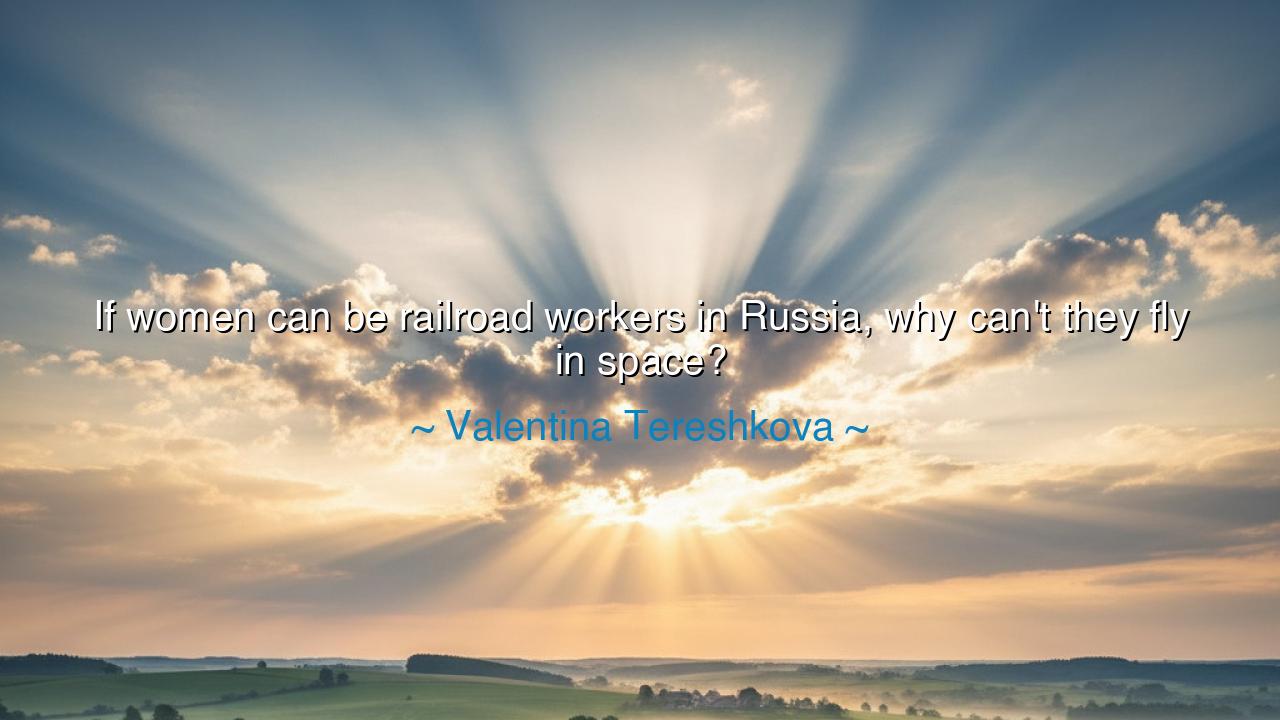
If women can be railroad workers in Russia, why can't they fly in






Listen closely to the words of Valentina Tereshkova, a woman whose bold spirit challenged the very boundaries of what was believed possible for women in her time: "If women can be railroad workers in Russia, why can't they fly in space?" With this striking question, Tereshkova challenges the norms of gender roles and the restrictive perceptions of what women can achieve. Her words carry the weight of centuries of patriarchy, where the physical and intellectual limitations of women were often presumed to be greater than those of men. She asks, not as a plea for equality, but as a declaration of the limitless potential of women, capable of achieving greatness in every field, even those once thought to be reserved for men alone.
The ancients too struggled with the limitations placed upon the lives of women, though many times in subtle or overt ways, the stories of old reveal the strength and resilience of women that defied expectations. In Greek mythology, the gods were not bound by the same earthly constraints as mortals, yet even among the gods, it was the goddesses like Athena, the goddess of wisdom and war, and Artemis, the fierce protector of the wild, who demonstrated that strength, intellect, and courage were not exclusive to men. In these tales, the goddesses were revered for their independence, their intellectual prowess, and their ability to overcome the constraints of the world around them. These figures embodied a power that, though often overlooked by the men who told their stories, was undeniably present.
In the same way, Tereshkova’s question echoes the ancient wisdom that women, like men, are capable of extraordinary feats. Her reference to railroad workers in Russia is particularly powerful—she points out that if women can perform the demanding, physically taxing work of maintaining the railway system, then why should the immense challenge of flying in space be beyond their reach? Her words invite us to reflect on the cultural biases that limit our understanding of what women can achieve. Throughout history, women have been told that their place is in the home, that their strength is not of the same measure as men’s. Yet, Tereshkova’s achievements in space were a clear refutation of that notion. In 1963, she became the first woman to fly into space, proving that the limits placed on women were artificial and unnecessary.
The example of Marie Curie, a woman who defied the prevailing ideas of her time and revolutionized science by becoming the first person to win Nobel Prizes in two different scientific fields, also sheds light on Tereshkova’s question. Curie’s groundbreaking work in the study of radioactivity not only changed the course of science but also shattered the myth that women were intellectually inferior to men. Just as Curie demonstrated that women could contribute to the sciences in groundbreaking ways, Tereshkova demonstrated that women could break through the stratosphere itself and enter the realm of space exploration. In both cases, they showed the world that strength, intelligence, and ambition know no gender.
Tereshkova’s words are not merely a call to action for women but a bold proclamation that society must break free from its limiting beliefs about gender. The barriers women face are not biological but societal. Just as the railroad workers in Russia demonstrated their strength, so too could women demonstrate their capacity to achieve greatness in any field. Tereshkova’s challenge is a universal one: why do we continue to limit people based on outdated perceptions? Her life is a testament to the possibility that lies beyond stereotypes, and a powerful reminder that human potential is not confined to the narrow views of what is "appropriate" for one gender or another.
The lesson to take from this wisdom is one of empowerment and possibility. Tereshkova does not suggest that women must prove themselves to be equal to men in all things, but that they should be allowed to choose their own path, free from the constraints of what others believe they can or cannot do. Her challenge is for us to look at the world with a more open and inclusive mindset, one that allows every individual—regardless of gender—to pursue their dreams and realize their full potential. Women must be encouraged, not to emulate men, but to boldly define their own space, whether in the workforce, in politics, in art, or even in the stars themselves.
Therefore, dear listener, let Tereshkova’s words serve as a guiding light in your own life. Do not allow the limitations of society to define what you can or cannot do. Reach for the stars, whether that is in the sciences, in leadership, in creativity, or in any pursuit that calls to you. The question she poses is timeless—if women can perform difficult tasks on the Earth, why should their ambitions be constrained when it comes to exploration? Let her example remind us all that our capabilities are not determined by outdated conventions, but by the strength of our will, the vision of our dreams, and the courage to break barriers. Let us all, regardless of gender, look to the stars and believe that the universe is ours to explore.






AAdministratorAdministrator
Welcome, honored guests. Please leave a comment, we will respond soon